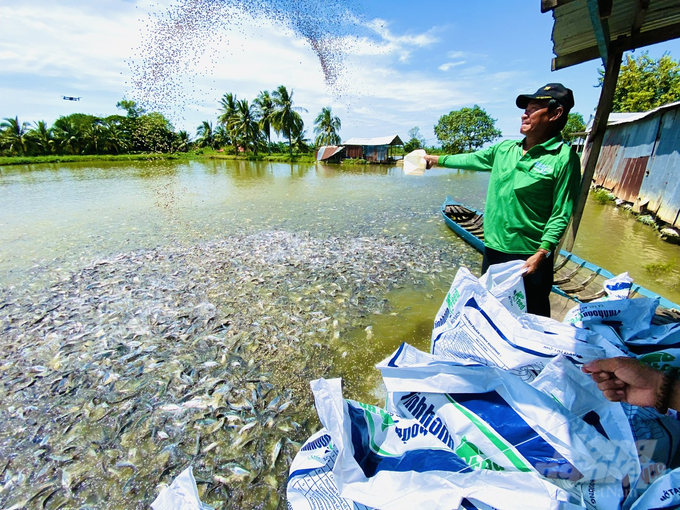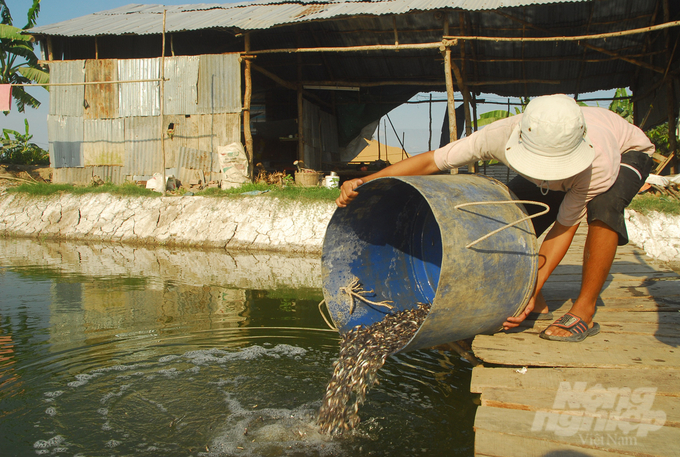June 3, 2025 | 10:07 GMT +7
June 3, 2025 | 10:07 GMT +7
Hotline: 0913.378.918
June 3, 2025 | 10:07 GMT +7
Hotline: 0913.378.918

With the aim of enhancing the efficiency of pangasius fingerling production, the agricultural sector encourages fish farmers to utilize vaccines during the finglering stage to minimize disease outbreaks and achieve optimal quality. Photo: Le Hoang Vu.
An Giang province produces a significant volume of commercial pangasius in the Mekong Delta region. Accordingly, An Giang province dedicates 1,200 out of its total 5,500 hectares to commercial pangasius farming, with an average yield of 450,000 tons and a value of nearly 380 million USD.
Mr. Nguyen Van Thanh, the owner of a pangasius fingerling production facility in Vinh Hoa commune, Tan Chau town, An Giang province, has over twenty of experience in the industry. He expounds that after an extended period characterized by a devaluation of pangasius fingerlings, where prices ranged within the lower bracket of approximately 25,000 - 26,000 VND per kilogram (pertaining to the 30 fish per kilogram category), the pricing dynamics of pangasius fingerlings in An Giang province have exhibited an upward trend, resulting in profitability for pangasius fingerling farmers.
At present, the 30 fish per kilogram variety has garnered attention from traders, who are procuring these fingerlings at prices ranging from 29,000 - 32,000 VND per kilogram. This signifies an increase of 4,000 - 5,000 VND per kilogram in terms of prices compared to that of two months prior.
According to the Directorate of Fisheries under the Ministry of Agriculture and Rural Development, the Mekong Delta region houses has 103 pangasius fingerling production facilities. Accordingly, there are at least 1,913 nursery facilities primarily located in the provinces of An Giang, Dong Thap, Long An, and Can Tho city.
Mr. Thanh delineated that the resurgence in pangasius prices can be attributed to a supply deficit in combination with an escalating demand, thereby inducing an augmented fervor within the pangasius fingerling market. Market participants are currently inclined to purchase pangasius fingerlings without exhibiting bias towards school size or disease-free fingerlings, as they aim to secure the entire inventory for subsequent resale.
The surge in demand for pangasius fingerlings can also be attributed to the current meteorological conditions prevailing in the Southwestern region, which is currently experiencing a heavy monsoon season. Consequently, fingerlings exhibit relatively low quality after developing from their fry stage.
In addition to weather-related factors, abnormal fluctuations in water temperature within the rearing ponds, exacerbated by the persistent rainfall, have led to the onset of diseases. Subsequently, these factors increased the costs of fish farming, a phenomenon commonly referred to within the industry as an "off-season." As a result, timely veterinary intervention for the fingerling stocks assumes paramount importance during this period, in order to ensure that the fish achieve optimal growth and quality to meet the market's demands.
According to Mr. Le Thanh Tam, the owner of a pangasius fingerling production facility located in Phu Hoa commune, Chau Thanh district, An Giang province, the recent rise in pangasius fingerling prices is driven by a shortage of fingerlings available for stocking in commercial fish farms.
There is a pervasive search for fingerlings to stock in commercial businesses as well as independent fish farmers. This proactive restocking initiative serves a dual purpose during the current season. Firstly, it aims to capitalize on the market's favorable conditions as the export market for pangasius is witnessing robust growth in late 2023 and early 2024.

Farmers stocking pangasius fingerlings in the Mekong Delta region, Vietnam. Photo: Le Hoang Vu.
Mr. Tran Anh Dung, Director of An Giang province's Sub-Department of Fisheries, noted that the production of pangasius fingerlings has become increasingly challenging in recent years. Accordingly, these obstacles are caused by the impacts of climate change as well as the declining water quality.
The quality of fish feed is of paramount importance in addressing these challenges, as the majority of pangasius fingerlings farmers are inclined to purchase cheaper and lower-quality feeds. Consequently, these purchases affect the overall quality of fingerlings, leading to a low conversion rate from fish fry to fingerling. This issue underscores the need for the aquaculture sector to provide a solution which ensure a steady supply of high-quality fingerlings, with an emphasis on the national pangasius export program.
With the aim of boosting the efficiency of pangasius fingerlings production, a parallel approach to the genetic broodstock selection involves the agricultural sector's active promotion of fingerling vaccination to local residents. These vaccines serve as a protective measure against diseases during the rearing process, thereby contributing to the mitigation of disease outbreaks. The prevailing vaccine widely utilized for this purpose is known as Panga 2.
Translated by Nguyen Hai Long

(VAN) Novel process harnesses machine learning to reveal groups of genes that determine how efficiently plants use nitrogen.

(VAN) Several scientists and farmers are experimenting with soil treatment in some key durian-growing regions such as Cai Lay (Tien Giang), Dak Song, Gia Nghia, and Dak R’lap (Dak Nong).
/2025/05/25/4127-3-073637_820.jpg)
(VAN) Thanks to the promotion from an FAO-implemented project, vegetable production in greenhouses in Moc Chau has seen strong development, from 1.5 hectares in 2021 to nearly 50 hectares in 2024.

(VAN) FAO has recently supported USD 140,000 to implement the project 'Risk mitigation human-animal interface risks through disease control initiatives in pig farming.'

(VAN) The People's Committee of Tra Vinh province has approved an adjustment to the investment policy for the Green Hydrogen Plant project, increasing its area to approximately 52.76 hectares.
![Reducing emissions from rice fields: [2] Farmers’ commitment to the soil](https://t.ex-cdn.com/nongnghiepmoitruong.vn/608w/files/news/2025/05/05/dsc08881jpg-nongnghiep-140632.jpg)
(VAN) Clean rice cultivation model in Thuong Tan commune, Bac Tan Uyen district, is assisting local residents in achieving sustainable agriculture by substantially reducing costs, increasing productivity, and protecting the environment.

(VAN) At the conference to disseminate Resolution No. 68, AgriS introduced its digital agricultural ecosystem and reaffirmed its commitment to accompanying the Government in promoting private sector development and sustainable agriculture.